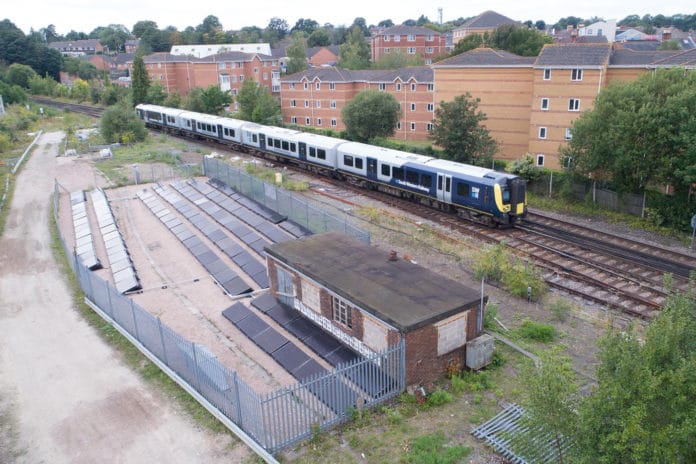While trains are more energy-efficient than automobiles, they do have their own effects on the environment. They produce nitrogen dioxide, CO2 and some other pollutants that can contribute to air pollution and negative health effects.
In this regard, countries are trying to find a greener form of power than diesel. Now, some trains in a small part near Aldershot are running on a railway line powered entirely by the “world’s first” solar farm (to power a rail line).
Around 100 solar panels are installed at the trackside that in total generate just 30kW of power, but that is enough to power the signaling and lights on Network Rail’s Wessex route. This small 30kW project is hoped could pave the way for a larger project capable of directly powering the trains that use this route from next year.
The project, called Riding Sunbeams, is developed by the charity 10:10 Climate Action in collaboration with Imperial College London, to solar-charge its rail lines across the country. The team says that the renewable energy could power 20% of the Merseyrail network in Liverpool, and 15% of commuter routes in Kent, Sussex, and Wessex as well as solar trains in Edinburgh, Glasgow, Nottingham, London, and Manchester.
It is not only a greener form of power than diesel but could also supply cheaper power than electricity from the natural grid, which would reduce costs for railways.
There are several UK train stations that already run on solar. However, it is the first time when a solar array will bypass the electricity grid to plug directly into a railway’s “traction” system, according to the Guardian.
Researchers have analyzed all the data to see how it might be possible to plug in large solar rigs to power UK’s trains. Passengers and communities near the railway line will have the chance to invest in the idea. The aim is to build and connect the world’s first-ever full-scale community and commuter-owned “solar traction farm” by the end of 2020.
